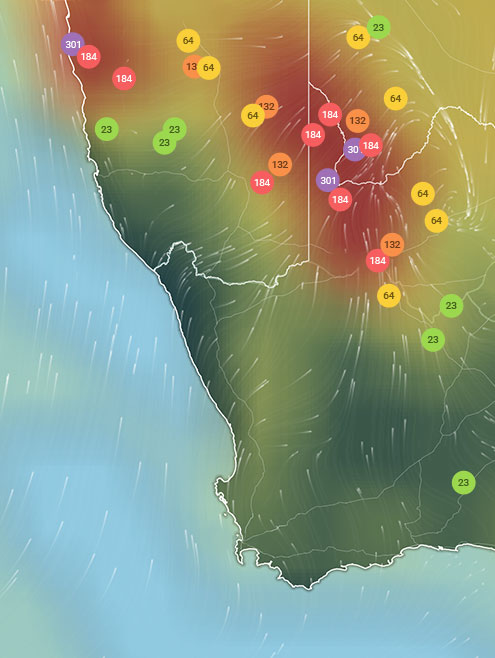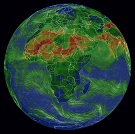Get a monitor and contributor to air quality data in your city.
3.6K people follow this city






AIR QUALITY DATA CONTRIBUTORS
Find out more about contributors and data sources| Weather | Scattered clouds |
| Temperature | 57.2°F |
| Humidity | 72% |
| Wind | 10.4 mp/h |
| Pressure | 29.8 Hg |
| # | city | US AQI |
|---|---|---|
| 1 | Seogwipo, Jeju-do | 61 |
| 2 | Geumsan, Chungcheongnam-do | 59 |
| 3 | Gongju, Chungcheongnam-do | 59 |
| 4 | Ulsan, Ulsan | 59 |
| 5 | Busan, Busan | 57 |
| 6 | Jeju, Jeju-do | 55 |
| 7 | Seosan, Chungcheongnam-do | 51 |
| 8 | Taean, Chungcheongnam-do | 50 |
| 9 | Gimcheon, Gyeongsangbuk-do | 49 |
| 10 | Gumi, Gyeongsangbuk-do | 48 |
(local time)
SEE WORLD AQI RANKING
| # | station | US AQI |
|---|---|---|
| 1 | Sinbang-dong | 57 |
| 2 | Seonggeo-eup | 53 |
| 3 | Baekseok-dong | 42 |
| 4 | Munseong-dong Administrative Welfare Center | 41 |
| 5 | Seonghwang-dong | 41 |
| 6 | Seongseong-dong | 34 |
(local time)
SEE WORLD AQI RANKINGUS AQI
47
live AQI index
Good
| Air pollution level | Air quality index | Main pollutant |
|---|---|---|
| Good | 47 US AQI | PM2.5 |
| Pollutants | Concentration | |
|---|---|---|
| PM2.5 | 11.3µg/m³ | |
| PM10 | 22µg/m³ | |
| O3 | 104µg/m³ | |
| NO2 | 16.9µg/m³ | |
| SO2 | 10.5µg/m³ | |
| CO | 343.5µg/m³ | |
PM2.5
x2.3
PM2.5 concentration in Cheonan is currently 2.3 times the WHO annual air quality guideline value
| Enjoy outdoor activities | |
| Open your windows to bring clean, fresh air indoors GET A MONITOR |
| Day | Pollution level | Weather | Temperature | Wind |
|---|---|---|---|---|
| Sunday, Apr 21 | Good 44 AQI US | 64.4° 53.6° | ||
| Monday, Apr 22 | Moderate 54 AQI US | 69.8° 55.4° | ||
| Tuesday, Apr 23 | Moderate 53 AQI US | 69.8° 50° | ||
| Today | Good 47 AQI US | 60.8° 48.2° | ||
| Thursday, Apr 25 | Moderate 81 AQI US | 69.8° 46.4° | ||
| Friday, Apr 26 | Moderate 88 AQI US | 75.2° 51.8° | ||
| Saturday, Apr 27 | Moderate 79 AQI US | 73.4° 50° | ||
| Sunday, Apr 28 | Moderate 77 AQI US | 82.4° 53.6° | ||
| Monday, Apr 29 | Moderate 78 AQI US | 68° 60.8° | ||
| Tuesday, Apr 30 | Moderate 82 AQI US | 66.2° 51.8° |
Interested in hourly forecast? Get the app
Cheonan, also spelled Ch'ŏnan, is a city in South Chungcheong, South Korea. According to a 2018 census, Cheonan had a population of approximately 667,000 people. This makes it the most-populous city or county in South Chungcheong, and the third most-populous city in the Hoseo region.
Towards the middle of 2021 Cheonan was experiencing a period of air quality classed as being “Unhealthy for sensitive groups” with a US AQI reading of 114. This United States Air Quality Index number is an internationally used set of metrics supported by the World Health Organisation (WHO) and is used to compare the air quality in different cities throughout the world using comparable standards. It is calculated by using the levels of the six most commonly found pollutants. If figures are not all available, the figure is calculated using what data there is. In the case of Cheonan, only PM2.5 was recorded which had a concentration of 38.5 µg/m³.
With levels such as these, the advice is to close doors and windows to prevent more dirty air from entering the room. Those of a sensitive disposition are advised to remain indoors or if travel outside is unavoidable, then a good quality mask is recommended. The use of an air purifier would be beneficial if one is available. All types of outdoor exercise should be avoided until the air quality improves, the table at the top of this page will help with that decision.
Air pollution can be very volatile and, as such, can change very quickly depending on many variables, such as wind speed and direction and the strength of sunlight.
Looking back at the figures published by the Swiss air monitoring company IQAir.com for 2020 it can be seen that the best time of year, as far as air quality is concerned, is January when the monthly average was 37.5 µg/m³ which placed it in the “Unhealthy for sensitive groups” bracket. Other than that, the air quality remained “Moderate” for the remaining 11 months with figures between 12.1 and 35.4 µg/m³.
Records have been kept since 2017 when the annual average reading was 27.7 µg/m³. A slight improvement was seen in 2018 when that figure was 25.4 µg/m³. 2019 saw a decline when the quality slipped back to 29.4 µg/m³, before a marked improvement in 2020 when the mean figure was 23.9 µg/m³. However, this may not be a true indication or reality because of the restrictions imposed due to the COVID-19 pandemic. Many vehicles were no longer used as the drivers were furloughed and allowed to work from home, if possible. There were also many factories and other non-essential production units which were temporarily closed in an attempt to prevent the spread of the virus.
About 45 per cent of the major sources of fine dust are identified as road transport pollution sources. Cheonan's high occurrence of fine dust is mainly due to its transportation hubs, including highways, railroads, and 310,000 registered vehicles.
The proportion of road transport pollution sources such as vehicles and railroads is 44.5 per cent, which is much higher than 32.1 per cent in the energy and industrial fields, so the degree of damage caused by vehicles is serious.
Fine dust refers to a mixture of solid particles and droplet particles in the air. These particles have various shapes and sizes because they are emitted not only from natural sources but also from various types of fixed or mobile sources. Fine dust is emitted directly from the emission source or is produced secondary by gaseous substances such as sulphur dioxide and nitrogen oxides. Fine dust aggravates respiratory diseases such as asthma and causes deterioration of lung function. In addition, fine dust deteriorates visibility, is deposited on the leaf surface of plants and interferes with metabolism, and is deposited on buildings, causing corrosion to sculpted relics and statues.
In order to solve the seriousness of fine dust, the city has decided to come up with a plan to reduce fine dust by 20% from next year to 2025.
Efforts to improve air quality due to air pollution and fine dust caused by automobiles by strengthening enforcement and crackdown on idling vehicles in idling restricted areas. The plan is to replace diesel city buses and old natural gas buses with eco-friendly buses, that is, electric and hydrogen vehicles.
First, the city will annually scrap 35,886 old diesel vehicles manufactured before 2005, install a diesel vehicle emission reduction device in operation, and supply 1,274 electric vehicles by 2022 and 1,600 hydrogen vehicles by 2030.
It will plant 5 million trees, secure three additional road dust suction vehicles by 2022, and purchase two additional road water cleaning vehicles.
The main symptoms of asthma are mainly caused by airway constriction due to inflammation of the airways and swelling of the mucous membranes. When an allergen is inhaled, the body's humoral immune system produces antibodies against the inhaled allergen. Then, when the asthma patient inhales the same allergen, these antibodies recognise this and activate the immune system to produce chemicals as a result of the inflammatory response, which causes inflammation and swelling of the airways, constriction of the airways, and more. It causes mucus to be released.
When the bronchi are narrowed by the above process, various asthma symptoms appear. In addition to the typical respiratory symptoms of asthma, such as shortness of breath, cough, and wheezing, there are many cases of atypical symptoms. There are cases where only a dry cough appears repeatedly, or when the chest feels tight, or only symptoms such as having phlegm in the throat. Asthma patients usually have symptoms such as shortness of breath worsening after catching a cold or shortness of breath or wheezing after exercise such as running.
When breathing dust floating in the air, some are removed by coughing, sneezing, ciliary movement, etc., but some are deposited on the alveoli and have a harmful effect on the human body. In particular, when a person breathes, it is said that fine dust with a particle diameter of 10 microns or less can reach the lungs through the respiratory tract and be deposited. The degree of reaching each part of the lung depends on the size of the particles, and the finer the particles, the deeper they can flow into the lungs. Most of the dust with a particle diameter of 1㎛ or more is caught in the mucous membranes and cilia of the nose or airways and discharged.
3Contributors
2 Government Contributors
5 stations
5 stations
Anonymous Contributor

1 station